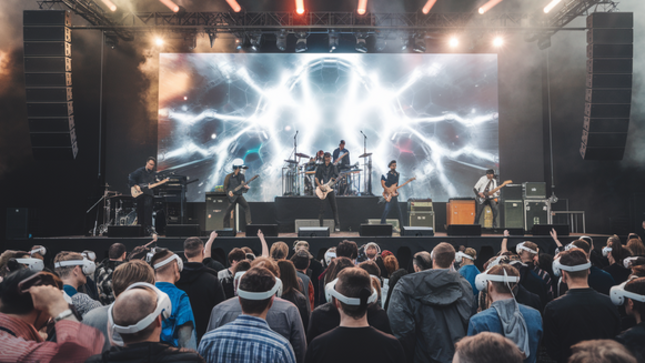
Modern technologies are radically changing the rock music industry. Musicians are using advanced digital solutions to create better recordings, and fans can enjoy virtual concerts from the comfort of their own homes. For example, Pin Up Casino also applies innovative technologies to improve user experience in the world of entertainment. In this article, we'll look at how technology is impacting studio recordings, live performances, and fan interaction.
Technologies in studio recordings
The process of recording music has changed significantly with the advent of digital technology. Previously, musicians relied on analog equipment, which limited their capabilities. Modern studios now use digital audio workers (DAWs) such as Pro Tools and Logic Pro, allowing artists to record, edit and mix music with high precision.
Advantages of digital technology in studio recordings:
● Sound quality: Digital recordings provide cleaner, clearer sound, allowing musicians to experiment with different effects.
● Editing: Musicians can easily change and edit their tracks, add new elements or correct errors.
● Availability: Thanks to cloud technology, artists can record and produce music remotely, increasing collaboration opportunities.
According to an article on the website Rolling Stone, many modern rock bands are starting to use mobile apps to record demos and manage their projects. This allows artists to create music on the go and quickly share it with others. Additionally, technology helps musicians track their progress and optimize the creation process.
Virtual concerts and live performances
Live performance is an important part of rock culture, but the COVID-19 pandemic has forced musicians to find new ways to interact with fans. Virtual concerts have become an integral part of the music industry, giving artists the opportunity to perform for their fans from the comfort of their home.
The use of virtual reality (VR) and augmented reality (AR) technologies has become a real revolution. Artists can create captivating visuals and immersive experiences for their audiences. For example, the Oculus platform offers users the opportunity to participate in concerts while in a virtual space, which allows them to feel like they are part of the events.
Advantages of virtual concerts:
● Availability: Fans can enjoy performances from anywhere in the world.
● Interactivity: Virtual concerts allow audiences to interact with artists in real time.
● New formats: Artists can experiment with new performance formats, including themed shows and unique visual elements.
According to the report on the website Forbes, many rock bands have begun to integrate VR elements into their tours, allowing them to offer fans unique experiences that cannot be had at traditional concerts. These approaches help artists maintain audience interest and create new sources of income.
Social Media and Fan Engagement
Technology has also changed the way musicians communicate with their fans. Social media plays a key role in promoting artists and building community. Musicians can use platforms like Instagram, Twitter, and TikTok to communicate with their audience and promote new content.
Benefits of Social Media for Rock Music:
● Audience expansion: Social media allows artists to reach new audiences and interact with fans around the world.
● Live broadcasts: Artists can conduct live streams, sharing their thoughts and news with fans in real time.
● Fan participation: Musicians can actively involve their fans in creating content, such as through competitions and polls.
According to a study conducted on the platform Hypebot80% of musicians say that social media has significantly increased their popularity and helped them attract more fans. This confirms that audience engagement through digital channels is becoming increasingly important.
Conclusion
Technology continues to have a significant impact on the world of rock music, changing both the process of making music and the experience of listening to it. From digital recordings to virtual concerts and active fan participation, these innovations are opening up new horizons for artists and their audiences. As this review shows, musicians, such as many in the rock genre, are successfully using modern technology to create unique and memorable experiences for their fans while continuing to remain relevant in the rapidly changing world of music.